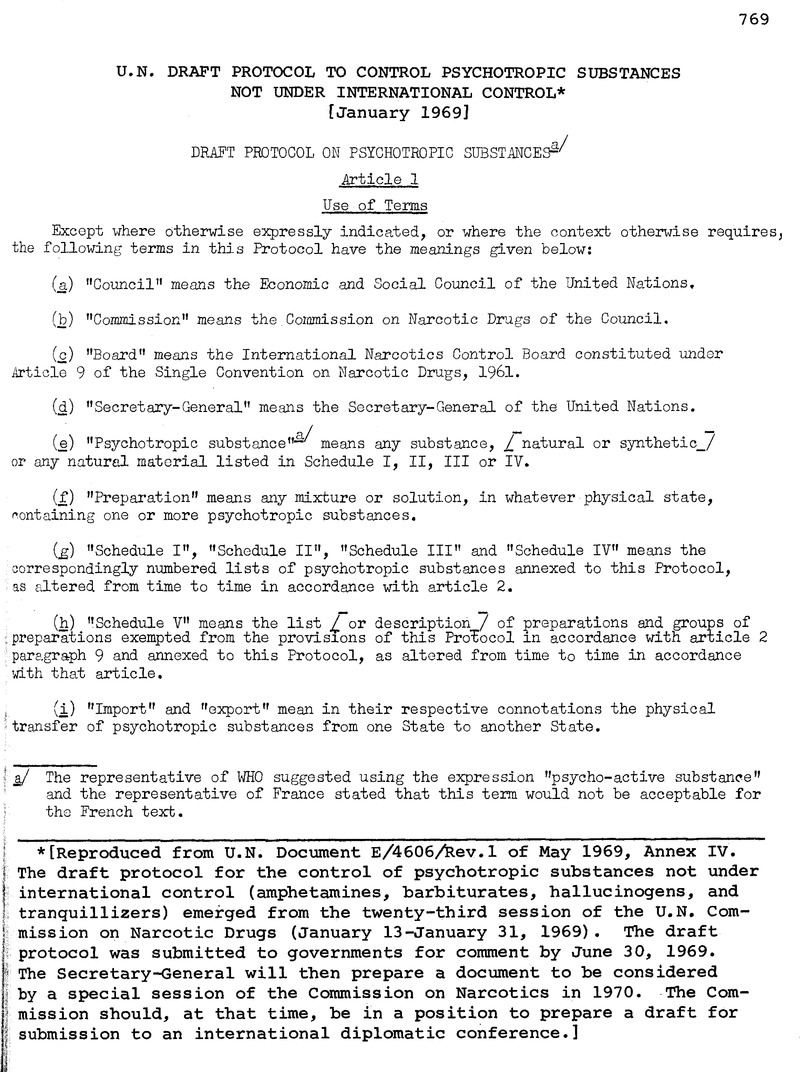No CrossRef data available.
Article contents
U.N. Draft Protocol to Control Psychotropic Substances Not Under International Control*
Published online by Cambridge University Press: 20 March 2017
Abstract

- Type
- Treaties and Agreements
- Information
- Copyright
- Copyright © American Society of International Law 1969
Footnotes
[Reproduced from U.N. Document E/4606/Rev.l of May 1969, Annex IV. f The draft protocol for the control of psychotropic substances not under I international control (amphetamines, barbiturates, hallucinogens, and tranquillizers) emerged from the twenty-third session of the U.N. Com-I mission on Narcotic Drugs (January 13-January 31, 1969). The draft ] protocol was submitted to governments for comment by June 30, 1969. The Secretary-General will then prepare a document to be considered by a special session of the Commission on Narcotics in 1970. The Com-mission should, at that time, be in a position to prepare a draft for submission to an international diplomatic conference.]
References
a The representative of WHO suggested using the expression “psycho-active substance” and the representative of France stated that this term would not be acceptable for the French text.
b This term will be retained only if the requirement for consumption statistics under article 14- is accepted.
c Corresponds to article 2 (a) in draft A (E/CN.7/519)
1 The representative of the USSR suggested that decisions should be communicated “to Governments, to the World Health Organization and to the Board”.
e It was suggested, as a possible variant, that the power of non-acceptance of decision might be confined to substances in certain schedules only.
f The representative of the USSR suggested that decisions should be transmitted “to Governments, to the Commission, to the World Health Organization and to the Board.”
g Corresponds to article 2 in draft A (E/CN.7/519).
h Corresponds to articles 3, 10 and 12 in draft A (E/CN.7/519).
i The Commission understood this expression to include veterinary purposes.
j Corresponds to article 17 in draft A (E/CN.7/519).
k Corresponds to article 9 in draft A (E/CN.7/519).
l Corresponds to article U in draft A (E/CN.7/519).
m The representative of Morocco suggested that “therapeutic” be replaced by “medical, pharmaceutical”.
n Corresponds to article 5 in draft A (E/CN.7/519).
o Corresponds to article 14 of draft A (E/CN.7/519).
p Corresponds to article 11 in draft A (E/CN.7/519).
q The delegations of the Federal Republic of Germany and France suggested that retailers should not be required to keep records in respect of preparations of substances in Schedule III.
r Corresponds to article 6 of draft A (E/CN.7/519).
s Several delegations reserved their position in respect of this paragraph, and of the application to psychotropic substances (apart from those in Schedule I) of the regime of import and export authorizations. Several other delegations suggested the application of the regime of export and import authorizations not only to substances in Schedule I but also in Schedules II and III.
t It was also suggested not to exchange the declarations between importing and exporting countries as mentioned in paragraph 3, but to apply the system described in paragraph 4 to substances in Schedules /II/, III and IV.
u Corresponds to article 7 of draft A (E/CN.7/519).
v Corresponds to article 13 in draft A (E/CN.7/519).
w Corresponds to article 18 in draft A (E/CN.7/519).
x As the Commission has not yet decided upon the substance on which statistical reports should be made, all schedules are listed, here so that the decision may be made by the deletion of reference to any schedule considered inappropriate for the purpose.
y If the statistics concerning consumption are not required, the term “consumption” in article 1 may be deleted. The explanation of “consumption” is based on article 1 (2) of the 1961 Convention.
z Alternative 1 corresponds to article 19 of draft A (E/CN.7/519).
aa Corresponds to article 15 in draft A (E/CN.7/519) .
bb Corresponds to part of article 16 in draft A (E/CN.7/519).
cc Corresponds to part of article 16 in draft A (E/CN.7/519).
dd New article inserted at the request of the Commission.
ee Alternative 1 corresponds to article 20 in draft A (E/CN.7/519).
ff Articles 21 to 23 were not discussed by the Commission and are reproduced here from document E/CN.7/519, for reference purposes.


